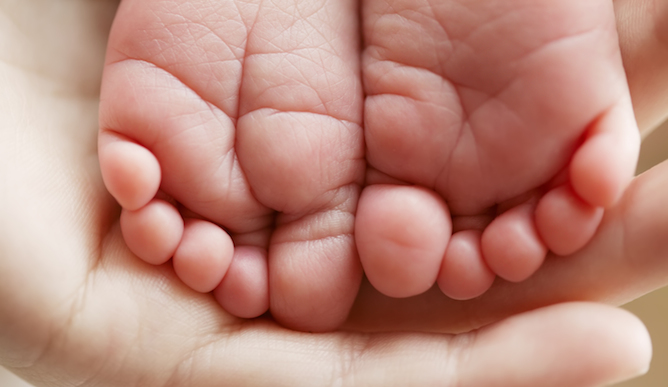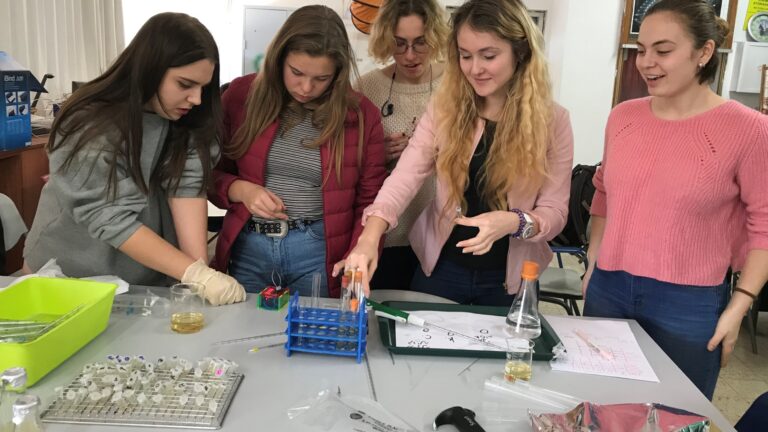A new Israeli study reveals that “kangaroo care” for premature babies has life-long effects on neurological and psychological development.
Conducted by Dr. Ruth Feldman – a professor in the department of psychology and in the Brain Research Center at Bar-Ilan University, and adjunct professor at the Child Study Center at Yale – the study shows that skin-to-skin contact between mother and newborn improves brain functioning later in life.
The concept of “kangaroo care” (named for the way that this marsupial carries her unformed offspring in her pouch) is not new. Introduced by neonatologist Edgar Rey Sanabria in 1978 in Bogota, Colombia — where access to incubators was limited — it is a method of using maternal body heat to prevent hypothermia in preemies.
That it proved effective in keeping infants warm made sense. But Feldman and her research team set out to examine whether it had a measurable influence.
They began performing a double-blind study in 1996 to 1998, looking at one group of 73 premature babies in a neonatal unit receiving standard incubator care, and another set of 73 whose mothers provided skin-to-skin contact for one hour a day for two weeks in a row. The parents in the control group were not aware of the kangaroo-care study, but were offered ongoing psychological and medical care for their babies.
At seven intervals over the course of the next decade, all 146 of these children were tested with brain scans. Today, they are 16 to 18 years old.
“What we found was that the children in the kangaroo-care group had better cognitive skills, sleep patterns and a higher functioning autonomic nervous system, better able to cope with stress,” Feldman told ISRAEL21c. “And their mothers were more sensitive parents.”
Could be mom or dad
This is a groundbreaking discovery because it provides scientific proof that premature babies, even in hospitals where there is no lack of incubators, experience long-term benefits from something as simple as having their mothers cuddle them for a short time every day.
When one considers that 12 percent of babies in the Western world are born prematurely, and the rate in underdeveloped countries is higher due to poor nutrition and sanitation, that’s quite a significant finding.
The adult providing the skin-to-skin contact does not have to be the baby’s mother – or so it would seem.
“But when we told parents involved in the kangaroo-care group that one of them would have to commit to being with the baby [in the neonatal department] every day for two weeks, it turned out to be the mothers who were better able to schedule it,” Feldman says, emphasizing that all the participants in the study are loving and involved parents.
No risk involved
Feldman, whose expertise extends beyond premature babies to include other areas of human development (such as interfamilial relations, parent-child relations, maternal depression, childhood depression and childhood stress and trauma), explains why holding a premature infant through clothing is not sufficient.
“There is a physiological response from skin to skin that is absent with fabric,” she says. “And it is the only way to guarantee thermoregulation — keeping a baby warm outside of the incubator.”
Nor does this contact require more than one hour daily. Feldman says there is no evidence to suggest that more time makes a neurological difference down the road. However, she believes the effects on the infant are linked to those experienced by the mother. Rather than forfeit breastfeeding, for example, the kangaroo mothers tend to want to pump their milk until the baby is strong enough to suckle.
“And statistically, these mothers end up breastfeeding their babies longer than other mothers,” she says, adding that this is just one way in which their bonding process is enhanced. Indeed, she claims that the extra sensitivity to these babies’ needs carries on throughout their childhoods – another contributing factor to healthier development.
As for the possibility of a premature baby being more susceptible to infection when removed from the incubator to lie naked against his or her mother’s body, Feldman says that the health benefits of skin-to-skin contact far outweigh the risks involved. “All that is required is taking the usual precautions when handling such infants.”
Feldman is encouraged by the extremely positive response with which her findings have been met by hospitals in Israel and abroad. Whereas before, the idea was that kangaroo care was important where incubators were lacking – and that even if it didn’t help, it couldn’t hurt – the new study shows that it is an integral, even necessary, part of a premature baby’s overall development and well-being.
















